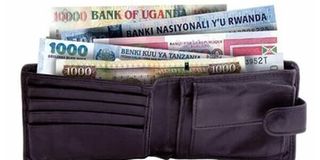Local experts share insights on what a common currency would mean for East African integration

What you need to know:
- The eight-member regional bloc aims to achieve a Monetary Union or Single Currency by 2031.
Dar es Salaam. Economic experts have outlined the potential of using a common currency in the East African Community (EAC), stating that it will deepen economic integration.
The eight-member regional bloc aims to achieve a Monetary Union or Single Currency by 2031.
The experts argue that the common currency stage will generate more economic benefits for residents and states through trade facilitation.
An economist and lecturer at the University of Dar es Salaam (Udsm), Dr Mwinuka Lutengano, said the common currency would be beneficial, especially in facilitating trade.
“By adopting a common currency, EAC member states will eliminate the need for currency conversions and associated transaction costs. This streamlines trade transactions, making it easier and cheaper for businesses to conduct cross-border trade,” he said.
He added that the use of a single currency would allow businesses within the region to price their goods and services more efficiently, leading to increased competitiveness and potentially higher export volumes.
“Reduced currency exchange risks encourage greater investment in trade-related infrastructure and logistics, further boosting regional trade,” he added.
Dr Lutengano also noted that the planned common currency would require the establishment of an East African central bank to oversee all matters concerning the common currency.
"I believe it will be a means of maintaining unity, cooperation, and solidarity among all nations because there will be significant interaction in all areas, not just commercially but also socially, and perhaps politically in the future," he said.
However, he expressed reservations about the loss of monetary policy autonomy among member states, which could limit their ability to address country-specific economic challenges.
Dr Wilhelm Ngasamiaku, an economics lecturer at the same university, said the common currency would allow member states to implement a unified monetary policy, ensuring price stability and lower inflation rates across the region.
“This stability fosters consumer and investor confidence, encouraging spending and investment,” he said.
“Stable prices contribute to macroeconomic stability, creating a conducive environment for sustainable economic growth and development,” he added.
Dr Ngasamiaku also highlighted that centralised monetary policy coordination could help mitigate inflationary pressures and economic imbalances within individual member states, promoting overall stability in the EAC economy.
He noted that the common currency signals a deeper level of economic integration and stability within the EAC, making the region more attractive to both domestic and foreign investors.
“Investors benefit from reduced currency exchange risks and transaction costs when operating across borders within the EAC, encouraging long-term investment commitments,” he said, adding that the availability of a common currency facilitates capital flows within the region’s productive sectors.
Dr Isaac Safari, a lecturer at Saint Augustine University of Tanzania (SAUT), said that the adoption of the common currency symbolises a significant step towards deeper economic integration in the EAC, promoting closer ties and cooperation in various sectors.
“Common currency fosters a sense of shared economic destiny among member states, encouraging collaborative efforts in areas such as infrastructure development, trade facilitation, and harmonisation of regulatory frameworks,” he noted.
“Enhanced regional integration strengthens the collective bargaining power of EAC member states in global economic forums and negotiations, amplifying their voice on international trade and economic issues,” he added.




